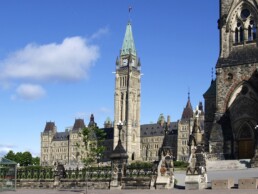Canada Among Top 4 Corporate Immigration Countries
Recent Findings Show More Highly-Skilled Workers Are Moving To Australia, Canada, The UK, And The US
Corporate immigration is fast becoming a major source of highly skilled work in Canada. Highly motivated and highly skilled immigrants bring with them a strong desire for success, and businesses in Canada are noticing. Coming from countries with poor economies and human rights records, these immigrants are nonetheless frequently the best choice for a position. In many cases, these individuals enlist the help of a corporate immigration law firm to help them through the immigration process.
As a recent study shows, Canada is one of the top four countries in the world where skilled immigrants choose to move to. Canada’s reputation as a country of opportunity and success is being noticed.
A study on migration patterns found that Australia, Canada, the UK, and the US are the top destinations for skilled immigrants, with the US taking the number one spot. More educated and highly-skilled people are moving to these countries for better job opportunities. There has also been an increase in the number of female skilled immigrants moving for corporate immigration purposes—for the first time, there are more female skilled immigrants than males immigrating for work.
These corporate immigrants benefit Canada’s economy by contributing their productivity, innovation, and existing wealth. They often bring new skills to the workplace, introducing new techniques to other workers. According to the study, around 75 percent of the software engineers in Silicon Valley are from foreign countries, as are more than 50 percent of the doctors in Western Australia. It is interesting to see that these major sectors employ more skilled immigrants than natural-born citizens.
Although the US tops the list for the most desired corporate immigration destination, Canada isn’t far behind. The US is internationally renowned as the land of opportunity, so more immigrants are still drawn to move there. However, Canada’s immigration laws might become more welcoming than those in the US, depending on the outcome of the US presidential election.
Unfortunately, many people still see skilled immigration as a threat to job availability. But with more skilled immigration comes greater contribution to the economy, thus improving job growth over time.
Corporate immigration doesn’t threaten our economy, it improves it. Instead of believing that Canada’s corporate immigration laws are too lax, and that skilled immigrants are taking all available jobs, think instead how good it is that our country is sought after as a home for its opportunities, both economic and social.
How to Double Your Presence in the Express Entry Pool
An Immigration Law Firm’s Advice: Apply With Your Spouse
In January 2015, the Conservative government introduced the Express Entry system as a means of ensuring that candidates for permanent residence would be processed based on their comparative skills and experience rather than simply who was first in line.
Express Entry and Reduced Processing Times
Since its conception, the Express Entry system has been beneficial for the government, some prospective immigrants, and corporate immigration law firms as it has successfully reduced processing times to as little as six months in most cases, a feat which is achieved by eliminating application backlogs from accumulating.
Additionally, the Express Entry system covers all of Canada’s key economic immigration programs, including:
- The Federal Skilled Worker Program;
- The Federal Skilled Trades Program;
- The Canadian Experience Class; and
- A portion of the Provincial Nominee Program.
Submitting an Expression of Interest (EOI)
In order to become an Express Entry candidate, prospective immigrants are required to submit an Expression of Interest (EOI). The EOI applicants who meet the minimum entry criteria are then added to the pool with all the other eligible candidates.
Ranking by a Points-Based System
Once in the pool, candidates are given points based on the information listed in their profile, and the individuals with the highest Comprehensive Ranking System (CRS) score will be invited to submit a full application.
How to Double Your Presence
While the Express Entry system helps skilled prospective immigrants get their invitation to apply quicker, as any corporate immigration law firm can tell you, it can still be quite a lengthy process for some as they may not have a high enough rank. Fortunately, there is a relatively simple way to double your presence in the pool: apply with your spouse.
Including Your Spouse in Your Application
When you submit your EOI, you will have to include your spouse and his or her credentials on your application. Though you will be considered the principal applicant, your spouse’s information such as his or her education, work experience, and language skills can all affect your CRS score.
Additionally, if both you and your spouse submit an EOI that names the two of you on each application, you’ll effectively have your names in the pool twice since chosen applicants can bring their spouse and dependent children with them. Should one of your applications get chosen, you can simply withdraw the other application.
Multiple Benefits with Spousal Applications
As any corporate or immigration law firm will tell you, there is a benefit to applying with your spouse, even though you would only expect the profile with the highest score to be selected first. Once you are in the Express Entry pool you are also eligible to create a profile for the Canada Job Bank.
If either you or your spouse receives an approved job offer from a Canadian employer, it will mean an additional 600 CRS points, which greatly increases your chances of being invited to apply. One of you may also be eligible to receive a notification of interest from a province, which could also give you an additional 600 CRS points if you are eventually nominated by that province.
If only one of you has created a profile, you may miss out on the opportunities that would have been offered to the other.
Get Started On Your Application
If you’re thinking about applying for Express Entry and submitting an EOI with your spouse, contacting a reputable immigration law firm can help put you on the fast track to permanent residency.
Constitutional Challenge of s. 10 of the Citizenship Act
The Right to a Fair Hearing as a Principle of Fundamental Justice
Section 10 of the Citizenship Act allows the federal government to revoke the citizenship of a person who obtained their citizenship by making false representations. Gerami Law PC represents a 19-year-old Montreal woman who was subjected to the application of this law. In 2006, when she was still a minor, she was granted citizenship. More than a decade later, in 2016, the government has alleged that her mother had misrepresented on their citizenship application the number of days she spent outside of Canada in the five years preceding the application. As a result, the government not only stripped the mother of her citizenship, but took away her daughter’s citizenship as well.
Any false representation on an immigration application or a citizenship application that culminated into the granting of Canadian citizenship can result in its revocation. Currently, the federal government has the discretion to exercise this power with little procedural safeguards in place, as there are no defined exceptions or factors that must be considered by the decision-maker in rendering their decision to revoke. This results in a fact-finding decision based simply on misrepresentation without regard to the circumstances of the person or to the compelling reasons why they should keep their citizenship.
There is no guarantee of an oral hearing; whether an oral hearing is granted is entirely at the discretion of the decision-maker. This is especially problematic because decision-makers do not have legal training and do not possess the expertise needed to render a decision in a procedurally fair manner that is consistent with the constitutional values of the Charter of Rights and Freedoms. As a result, the vast majority of persons subjected to the application of this law are not granted an oral hearing. Even if a hearing were to be granted, the Minister envisioned this as an informal interview, without the right to disclosure, the right to counsel, and the right to present and cross-examine witnesses. Denying the right to make oral submissions and denying safeguards that come along with an oral hearing is procedurally unfair in administrative law matters where important facts are in dispute, where an assessment of the person needs to be undertaken, and where the decision has a significant impact on the person, which is all the case in these revocation proceedings.
A constitutional challenge of the Citizenship Act has thus been launched at the Federal Court seeking a declaration that section 10 is unconstitutional and of no force or effect, and seeking a prohibition from applying it against the 19-year-old woman. Although a stay of proceedings on the Minister’s decision to revoke the 19 year old woman’s citizenship has been granted in this case until the courts rule on the constitutionality of the process, in the meantime the federal government has stated that it will continue to revoke the citizenship of other immigrants who misrepresented on their applications. This decision by the government to continue stripping citizenship from immigrants comes despite the fact that they have acknowledged the revocation process is unfair. This is especially problematic for persons who can’t find a lawyer or who don’t have the knowledge or resources to hire a lawyer, as they may not be able to challenge the Minister’s decision to revoke where they may have grounds to do so.
Canada’s Immigration Tactics are Failing Children and Families
Many Children And Families Who Have Sought Immigration To Canada Are Being Detained
Although Canada has become a leader in admitting thousands of refugees in the past year, the treatment of those who have been denied refugee status is anything but welcoming. There is debate over whether or not Canada’s immigration procedures are violating both Canadian and international laws in the name of public safety.
Although concern for the safety of Canadian citizens is commendable, the treatment of immigrants who are denied entry into Canada is, by many accounts, appalling, especially when it comes to the treatment of children. In response to these cases, Canadian immigration advocates are speaking up about the poor treatment of those denied refugee status in Canada.
According to a recent National Post article, in the past four years, Canada has incarcerated an estimated 242 children per year in immigration detention centres. This is, however, simply the average number of formal foreign detainees, as it doesn’t take into account children born in Canada (who are, therefore, citizens) to parents who are denied refugee status. These Canadian children are detained to avoid leaving them alone or uncared for.
Ranging in age from newborns to teenagers, detained children suffer from separation with their parents during their detention. Frequently, these families are held because they are considered flight risks who may try to avoid deportation, fleeing the country prior to a trial or hearing that could determine their refugee status.
By many accounts, Immigration detention centres are run like prisons, with 6 AM breakfasts, a half hour of outdoor time, and other strict routines. One teen interviewed recalled being handcuffed whenever he left his family’s room. Contact with separated family members is restricted, and gifts of candy from visitors are confiscated.
These prison environments are devastating to the children living there. Their mental health is jeopardized, especially when they are separated from their parents.
Canada is working on alternatives to housing children in immigration detention centres. The government has invested money, and is looking for better options. In the meantime, children will continue to live in these detention centres, and suffer from life-long mental health issues as a result.
Policy Reform Needed For Canada's Immigration System
Increased Concerns over Current Policy Regimes Cause Refugee Lawyers and Canadian Law Students to Demand Reform From the Canadian Government
On October 6, 2016, law students from several Canadian cities were to meet with members of Parliament in Canada’s capital to push for reform of Canada’s refugee system. The meeting in question aimed to address growing concerns among both refugee lawyers and law students regarding the many shortfalls of Canada’s current asylum system, specifically the failure to account for realities of refugees fleeing war and persecution.
Among the policy regimes under scrutiny is the Designated Foreign National (DFN) regime, implemented by the former government in 2012 to deter so-called irregular arrivals to Canada. Under the regime, the government deems as Designated Foreign Nationals persons who arrive in Canada without required documents and who government officials believe have traveled on documents obtained from smugglers.
Upon such designation, individuals are then automatically placed in immigration custody until they can provide proof of their identity and without any recourse to the courts to review the decision. The simple fact that persons fleeing conflict and persecution often have no opportunities or realistic prospects to obtain identity or other documents does not factor into the designation process. Effectively, these asylum seekers are afforded less procedural protections without taking into account their day-to-day realities.
Other apparent shortcomings in the current refugee system include the Designated Countries of Origin (DCO) regime and Canada’s immigration detention practices, which see women, children, and persons with mental illness placed into detention centers, sometimes indefinitely. The lack of procedural protections and unquestionable violations of human rights under these regimes have attracted significant scrutiny of the system for some period of time now, both in Canada and internationally. So far, the response to the criticisms and growing concerns has been slow and inadequate.
As the number of persons in need of asylum continues to grow worldwide in today’s humanitarian crisis, the need for a fair and effective refugee protection system in Canada, based on respect for human rights, has never been so apparent. As such, it remains an enduring hope among immigration and refugee lawyers that the increased pressure to reform the current system will finally push the Canadian government to take much-needed action.





